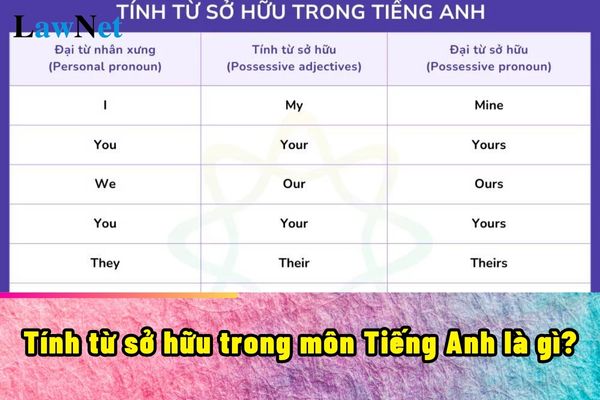What are possessive adjectives in English? When do students in Vietnam learn possessive adjectives in English?
What are possessive adjectives in English?
Possessive adjectives in English are used to indicate possession, meaning something belongs to someone or something. They typically precede a noun to identify to whom or what the noun belongs.
| *Common possessive adjectives: My: mine Your: yours His: his Her: hers Its: its Our: ours Their: theirs *Usage: Placed before a noun: This is my book. They are their toys. Does not change whether the noun is countable or uncountable, singular or plural: This is my car. These are our houses. *Examples: My sister is a doctor. Your phone is ringing. His car is very fast. Her dress is beautiful. Its tail is long. Our school is big. Their parents are teachers. *Note: Do not confuse with possessive pronouns: Possessive pronouns replace nouns and possessive adjectives + nouns. Example: This is my book. → This is mine. Possessive adjectives are commonly used to avoid repetition of nouns. *Exercise: Fill in the appropriate possessive adjective in the blank: ... dog is very cute. This is ... house. They are ... friends. |
*Note: Information is for reference only./.

What are possessive adjectives in English? (Image from the Internet)
When do students in Vietnam learn possessive adjectives in English?
Pursuant to Section V of the General Education Curriculum for English issued along with Circular 32/2018/TT-BGDDT, the required content for teaching English at the primary level is as follows:
Primary Level
*Phonics:
Phonics teaching content at the primary level is presented in two areas: spoken language and written language.
- Spoken language: vowels, consonants, and some consonant clusters; word stress, sentence stress, and basic intonation.
- Written language: the relationship between sounds and written letters for spelling, reading, and writing correctly the words and phrases learned.
*Vocabulary:
- Vocabulary teaching content at the primary level includes common, simple, concrete words at Level 1 in English, serving communication situations within the scope of the system's topics and themes in the Curriculum. The number of vocabulary words stipulated at the primary level is about 600 - 700 words.
*Grammar:
- Grammar teaching content at the primary level includes structures that serve the development of communication skills at Level 1, such as declarative sentences, questions, commands, affirmative sentences, negative sentences, simple sentences, present simple tense, present continuous tense, past simple tense, future simple tense, modal verbs, singular nouns, plural nouns, personal pronouns, demonstrative pronouns, interrogative pronouns, possessive adjectives, possessive pronouns, adverbs, cardinal numbers, ordinal numbers, common prepositions, common conjunctions, articles…
Therefore, possessive adjectives in English will be taught from the primary level, specifically in Grade 3.
What are regulations on assessment of educational outcomes for English at the primary level in Vietnam?
Pursuant to Section VII of the General Education Curriculum for English issued along with Circular 32/2018/TT-BGDDT, the assessment of educational outcomes for English at the primary level is as follows:
- Exams and assessments are important elements in the teaching process, aimed at providing feedback on the communication skills in English that students achieve during the course and at the end of a study period.
- This helps encourage and guide students in their learning process, assisting teachers and schools in evaluating students’ learning outcomes, thereby adjusting the teaching of the subject effectively at different educational levels.
- The assessment of students' learning activities must closely follow the goals and content of the Curriculum, based on the required outcomes for communication skills at each grade level, aiming to help students achieve the prescribed proficiency levels upon completion of primary, lower secondary, and upper secondary levels.
- The assessment activities should include both continuous assessment and periodic assessment. Continuous assessment is carried out regularly through classroom teaching activities.
- During teaching, special attention should be given to prioritizing continuous assessment to help students and teachers monitor the progress toward the goals set in the Curriculum. Periodic assessment is conducted at specified times during the school year to measure the extent of achievement compared to the required outcomes for each grade level.
- Assessment at the end of primary, lower secondary, and upper secondary levels must be based on the foreign language proficiency requirements according to the 6-level Foreign Language Proficiency Framework for Vietnam, specifically Level 1 for primary, Level 2 for lower secondary, and Level 3 for upper secondary levels.
- Assessment should be conducted through various forms such as quantitative, qualitative, and a combination of both quantitative and qualitative methods throughout the learning process, incorporating teacher assessment, peer assessment, and self-assessment by students.
- The types of tests and assessments should be appropriate to the teaching methods applied in the classroom, including oral tests (dialogues, monologues) and written tests that integrate language skills and knowledge, combining multiple-choice questions, essays, and other assessment forms.
>>> Download the General Education Curriculum for English.

